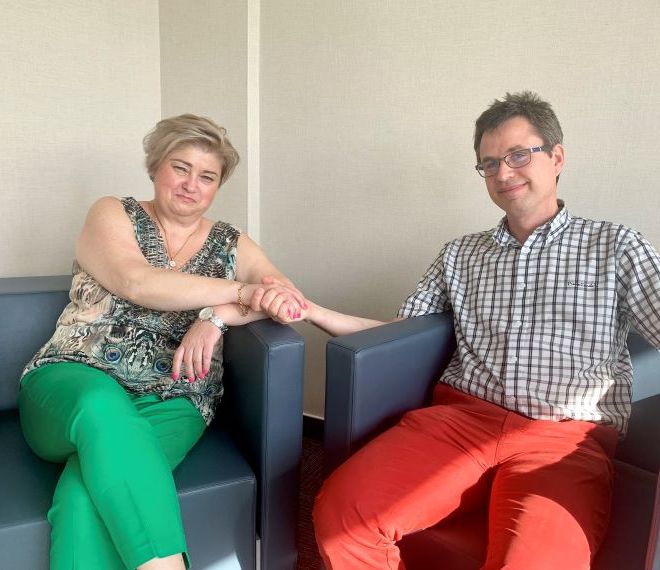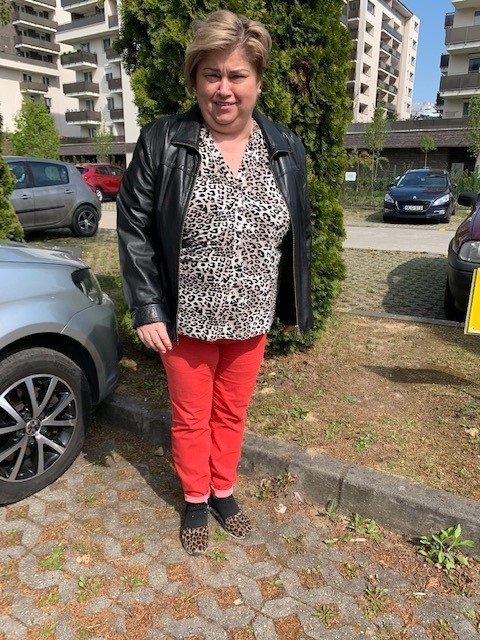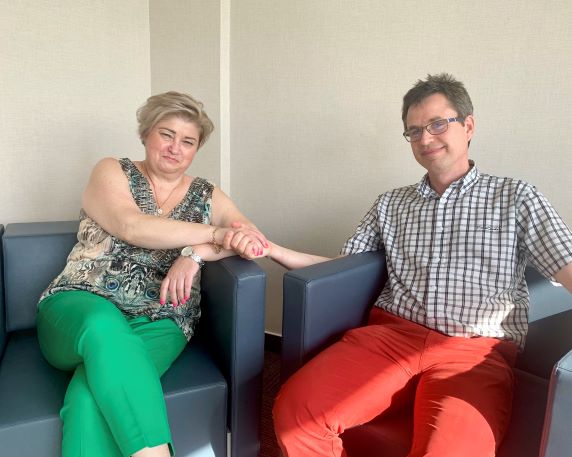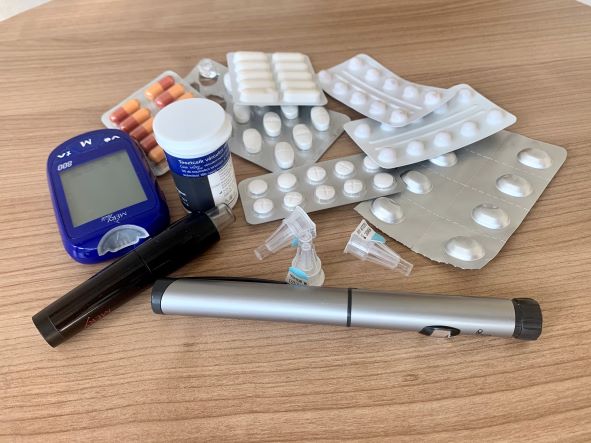Without insulin and diabetes medications after gastric bypass

Hello Melinda! Did you bring photos with you?
Yes, I brought some old pictures as we discussed. I used to really dislike having my picture taken, but today I stood in front of the mirror in the elevator and took a picture of myself!
How did you get to the point where you choose a surgical solution to overcome excess weight?
I am a person of sudden decisions. I knew that there were such operations, I was also aware of how much it would cost. I'm very sorry that I didn't make this decision sooner. There was a period of ten months in my life when I was between two jobs, then it would have been better because I could have taken care of myself more. There comes a point in a person's life - at least it came in mine - when I said, well, this weight is too much now. For some reason, Facebook knew this and started throwing in bariatric ads. I started following a site, and then my mom came, who had read an article in a women's magazine, and said to me: "What's the point of having money set aside if you don't have health and want to lose weight. Look for that!” It happened during a Sunday evening dinner, and I was already registered at a place at 9 o'clock, which I went to, but it was not friendly. I didn't get any answers to my questions. Then I searched further and found a group where a compilation was available of who the doctors are and which are the institutions where such interventions are performed. I looked through all of them, contacted them. Doctor Vasas was the first to report back, followed by everyone in line. After I spoke with Dr. Vasas, I canceled everything else, because the most important thing for me, trust, immediately developed in me. I received answers to the most important questions concerning me. The next day, I wrote to him that we should get started then.
What were these important questions?
My diabetes. What will happen after the surgery. Losing weight is one thing, but what about my sugar? Who will treat me after the operation? Can someone tell me what to do? And to this question of mine, although I always asked it purposefully, I didn't get an answer. It was also not pleasant for me to decide between the two types of surgery (bypass and sleeve - ed.). I can tell you whether to establish a Bt or a Kft, but I cannot decide which type of surgery to choose. I contact a specialist to tell him my data and based on that he tells me what he recommends and what he finds useful. And I only got this here.
What convinced you that gastric bypass surgery would help you the most?
Bypass surgery is recommended for type 2 diabetes. After that, I read how the surgery is done, and then what processes can be expected, and I thought that this would be the better solution for me.
Was there anything that unsettled you?
No! It was a straight road.
So the decisive argument was to solve diabetes…
Yes.
How did your environment react to your decision?
My mom immediately supported me and assured me that we would solve everything together. A good friend of mine, who is also my colleague, was the first to yell at me, sweep the papers off the table, make a fool of me, and leave me. Then, after he understood at night that this was also about my diabetes, he stood by me the next day. Anyway, I didn't experience a negative attitude from anyone. I'm not hiding it. If someone asks, I talk about the surgery. I got only one bad feedback, which sounds funny, but from my own diabetologist. I told you at the quarterly review that I was thinking about it. He scolded me, made me stupid, told me that I was going to fail, and that it was not good for anything, it was just a waste of money. I came crying. Finally, the others in the supportive Facebook group encouraged me to find another diabetologist and recommended Dr. Éva Bajnok (Dr. Éva Bajnok, obesitologist, endocrinologist, diabetologist internist at the Duna Medical Center). Since the surgery, I have already been to my own diabetologist. By the time I went, he had already calmed down, checked my data in the EESZT, so he already knew about my surgery. He didn't say anything, he just asked if I needed any medicine. I told him no thanks. He wrote on my outpatient card that he had "left insulin" and said to see him in September.
I also have doctor friends who supported me and were happy with my decision.
Let's talk a little about how much weight you've lost!
When I decided to have the surgery, I weighed 103 kilos. Then came COVID, then I lost 5 kilos, and with the pre-surgery diet I lost another 2 kilos in two weeks. So before the operation I weighed 96 kilos. This morning, 6 weeks after the operation, it is 84, so so far I have lost 12 kilos and 16 centimeters from my waist. My goal is to be 63-65 kilos.
I've already started to move, although I know it's too early, the girls even stabbed me for it, but I wish for movement. I was already wondering if the surgery had taken place, because I really don't have any problems. After the operation, I didn't have any pain, I switched to the painkiller, but it has been in the cupboard ever since, I haven't taken a single one. I didn't vomit, I didn't have diarrhea, I only experience minimal hair loss. I can already see the weight loss on my skin.
Before surgery...

...and after.

How did you start the movement?
I started with a walk, then a fast walk, then yesterday I realized that it was already a jog, and I had four kilometers. I can handle it physically, although in the evening, when I go to bed, I fall asleep immediately, there is no "lamb count". But I wake up early in the morning. I am much more energetic. Before that, I had difficulty falling asleep, and in the morning I woke up tired and grumpy.
Did you feel any physical discomfort or strangeness after the operation?
I used to have a bad habit of eating fast. If I don't pay attention and don't chew the food enough, I feel that the wall doesn't go down as easily, I feel that the stomach is narrower or the intake is smaller. I can hear and feel them when they are digesting. I need to pay more attention to fluid intake, because the 2-2.5 liters I'm consuming now are not enough. I wasn't the type of diabetic who drank a lot, and I have to pay close attention to that now. I wasn't hungry for a long time, but now I won't say that I don't feel hungry - but not always and not every day. The constant feeling of hunger is gone. If I feel that I am hungry and it is not yet time, I prefer to drink. When I was still on insulin, I could tell exactly what time it was by how hungry I was, and I got used to always eating at the same time. I kept this.
I can eat less, but I consciously pay attention to the quantity. I measure everything and keep a food diary. I bring food with me every day. One of my co-workers is a fitness trainer, so every day at ten o'clock he tells us to go to lunch. So the two of us sit down, he eats his large portion and I eat my 80 gram yogurt. We go to lunch at 12, then he leaves, but at 3 he calls me to have a snack. So I eat six times a day, small ones, and measure everything.
I often find great recipes on foreign websites that can be made with domestic ingredients. It helps that they all have the nutrient content, so I don't exceed my needs. It's my birthday soon and I'll be baking a cake!
What was the most difficult moment during the preparation and the operation?
When the nurse came into my room at 11:30 before surgery and said that they were already cleaning the operating theater after the previous patient... Well, then it occurred to me: maybe I should pull out the infusion, pack it up and go home . I also thought about what if they put me to sleep and I won't wake up. Of course it wasn't. I wasn't afraid of the surgery itself, nor that it would hurt. Of course, it hurts when people get cut here and there, but I trained myself that everything will be fine, it won't hurt, I'll be fine, I'll be able to handle it. And so I arrived at the surgery.
And what are your best experiences so far?
These pants I'm wearing now have never fit me before. My closet is full of clothes that I haven't worn in 10-15 years. Well, now I won't have such a problem. I really like losing weight! Also, the fact that I stopped taking insulin immediately after the surgery and I don't take any kind of "sugar medicine", but really nothing. I eat everything, even bread - the good, low-carb kind - and still have very good blood sugar levels. It's always been higher for me in the morning, but now it's around 6 in the morning, and 5 during the day, often 4.
I took medicines for 5-6 years, and then for 13 years, a constantly increasing amount of various medicines and insulin, and I also measured blood sugar levels of 7-8-9. It was as if all this medicine didn't help. This is the biggest achievement. Strictly taking and managing the medicines was also a constant difficulty. Another positive is that I have to take less of my thyroid medication due to my decreasing weight. In fact, according to the doctor, I can stop taking blood pressure medication after 2 months.
I feel like I made the best possible decision.

How do you feel?
Well! I like it! And that happened a long time ago. I feel the world opening up.
What are your plans for the future?
Gym, running, and buying up the nearby mall :) One day, someone told me, don't wear this blouse anymore. Well, yes, I saw it that way, but I didn't feel like changing in the morning. I also have to buy shoes, because my feet have also become smaller...
Dr. Péter Vasas: The patient developed insulin-dependent diabetes that developed with a relatively low excess weight and was difficult to control. Structurally, the extremely dangerous so-called He had "central obesity", i.e. he had a pronounced "tummy". Roux-en-Y gastric bypass surgery creates a significant metabolic improvement through its favorable hormonal effect on the incretin axis, which develops within days to weeks, often much sooner than the patients' weight loss. As a result, the body begins to produce and utilize insulin to a much greater extent. Patients report that they are not hungry, feel good, have much more energy, and their blood sugar levels are also under control. However, even after significant weight loss, a healthy diet, regular vitamin intake and regular exercise are necessary to maintain success. We are sure that Melinda also likes the regular run, and next year she will join us on the now traditional annual bypass run, which we plan to hold on September 11, 2022.
